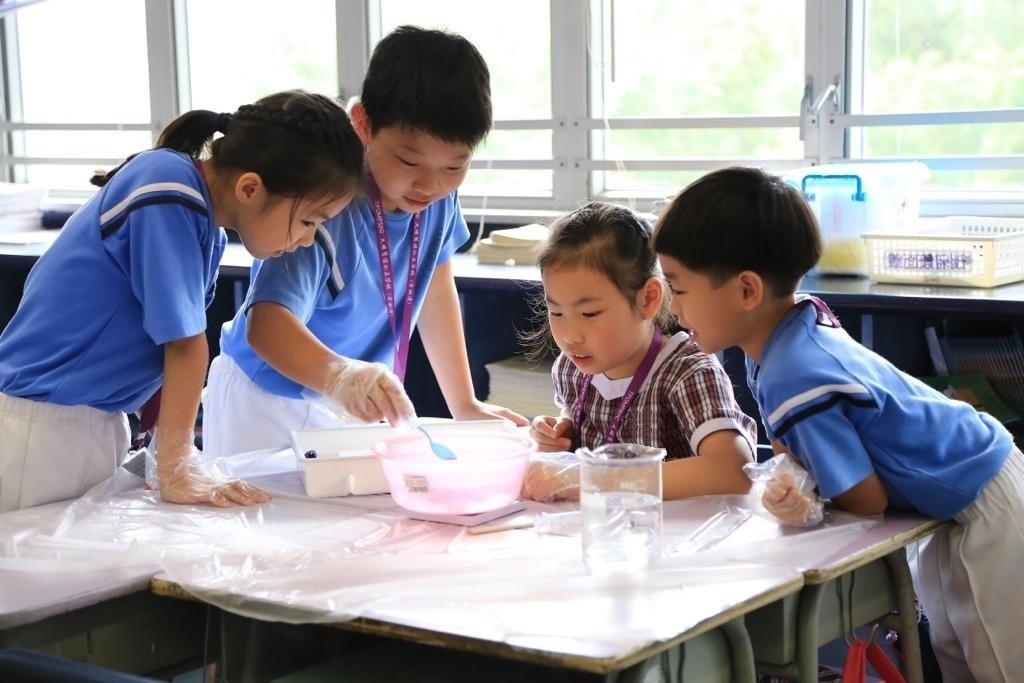ElementaryEducation
PrimarySchool(7photos)
Inadditiontothecharacteristicsofeducation,elementaryeducationhasuniquebasiccharacteristics:First,itisuniversal;Thesecondisobligatory;thethirdiscomprehensive.ElementaryeducationinstitutionswerefirstborninGermanyinthesixteenthcentury,sponsoredbycitiesandtowns,andtaughtpracticalknowledgeandProtestantteachings.
Atthebeginningoftheseventeenthcentury,suchschoolsgraduallyincreasedandbecameinstitutionsthatimplementedcompulsoryeducation.Afterthebourgeoisrevolution,EuropeancountriesandJapanwerealsoestablishedoneafteranother.
The"primaryschool"thatteacheschildrenliteracyisalsocalled"Mengxue"inancienttimes.Itincludestwomeanings:educationstageandeducationplace.Themaincontentofeducationisliteracy,writingandfeudalmoraleducation.Thetextbooksaregenerally"Mengqiu","ThreeCharacterClassics","HundredFamilySurnames","ThousandCharactersWen","FourBooks",etc.Thereisnofixednumberofyears.Useindividualteaching,payattentiontorecitationandpractice.Studentsinschoolarealsocalled"Mengsheng".
ModernschoolsandeducationsystemswereintroducedintoChinabyWesternmissionaries.Attheendofthe19thcenturyandthebeginningofthe20thcentury,thefoundersofmoderneducationinChina,HeZiyuan,QiuFengjia,andotherspioneeredthetrend,eliminatedtheinterferenceofstubbornandconservativeforces,successfullyintroducedWesternlearning(Americaneducation),andestablishedanewschooltobringcivilianeducationintothevisionoftheManchucourt.Underthepressureofthesituation,theQinggovernmenthadnochoicebuttoopenthedoortotheeducationinnovationnetwork.Attheendof1905,itpromulgatedanewschoolsystem,abolishedtheimperialexaminationsystem,andpromotednewschoolsnationwide.InthefirstyearofXuantong(1909),afterthelocalimperialexaminationsreallyceased,Westernlearninggraduallybecamethemainformofschooleducation.
RuralElementarySchool
TheNationalGovernmentreformedelementaryschoolsin1915Theschoolisanationalschool,"toteachthefoundationofnationalmoralsandthegeneralknowledgeandskillsnecessaryfornationallife".The"primaryschoolclass"isdividedintoelementaryschoolclassandhigherschoolclass.Enrollattheageofsix,andstudyforfouryears.Aftergraduation,youcanenteraprimaryschool(threeyearsofstudy)dependingonthespecificsituation.Thereisalsoapreparatoryschool,paralleltothenationalschoolandelementaryschool,"toprovideelementarygeneraleducationandprepareforthepromotiontomiddleschool."Nationalschoolsaredividedintoearly(fouryears)andlate(threeyears).In1922,thenationalschoolwaschangedtoelementaryschoolandthepreparatoryschoolwasabolished.In1940,theNationalGovernmentimplementedtheso-called"integrationofmanagement,education,care,andsanitation",stipulatingthateachtownshipshouldestablishacentralnationalschool(equivalenttoacentralprimaryschool),withthetownshipchiefservingasthecaptainandprincipalofthetownship’syoungandmiddle-agedcadresconcurrently,andtheestablishmentofnationalschools(equivalenttoVillageprimaryschool),theprincipalisconcurrentlyservedbythesecuritychief.
AfterthefoundingofthePeople’sRepublicofChina,acentralelementaryschoolwassetupatthetownship(people’scommune)level,andvillageprimaryschoolsweresetupineachvillage(productionbrigade).Withtheaccelerationofaging,theproportionofyoungchildrenhasdeclined,thesourceofprimaryschoolstudentshasdecreased,andvillageshavebeguntomerge,andmanyplacesonlyretainboardingcentralprimaryschools,whichmakesitextremelyinconvenientforstudentswhotravelfarawaytogotoschool.
NewChina’sprimaryschoolsystemabolishedthedistinctionbetweenjuniorandseniorprimaryschoolsintheRepublicofChina,andimplementedaconsistentsystemofprimaryschools,withfive-yearandsix-yearprimaryschoolssuccessively.
Duetotheimplementationofnine-yearcompulsoryeducation,examinationsarenolongerimplementedforthepromotionofelementaryschooltojuniorhighschool.
Offeringcourses
Basicelementaryschooltextbook"CommonSense"(2photos)
Chinese,mathematics,English,moralityandruleoflaw,science,informationTechnology(computerbasics),sports,music,art.Stageclassification
Juniorprimaryschool
Juniorprimaryschooliscalled"juniorprimaryschool",whichreferstothestageofeducationfromthefirstgradetothefourthgradeofprimaryschool.Thosewhohavepassedthefourthgradewillhavea"juniorelementaryschool"degree.Itwasinthe1970sthatelementaryprimaryschoolsweregenerallyestablishedinChina’sunderdevelopedruralareas.Ruralschoolsinmanyareasare"oneschool,oneteacher,oneclassroom,oneclass"elementaryprimaryschoolcompoundclasses.Oneteachertookcareofallcoursesin4grades.Elementaryandelementaryeducationisofgreatsignificancetotheeradicationofilliteracy.
Higherprimaryschool
Higherprimaryschooliscalled"seniorprimaryschool",whichmeansthatthefifthandsixthgradesofelementaryschoolarecalled"seniorgrades".Thosewhohavepassedthehighschoolandprimaryschoolwillobtainahighschooldiploma.Before1949,seniorprimaryschoolsinChinawerenotcommon.
Endelementaryschool
Ruralelementaryschool(8photos)
TheschoolwithelementaryelementaryschoolandadvancedelementaryschooliscalledItisa"completeelementaryschool",referredtoas"completeelementaryschool".AfterChinaimplemented"universalnine-yearcompulsoryeducation",theestablishmentofruralprimaryschoolshasbecomeabasicstandard.Primaryschoolsincountytownsandcitiesabovearegenerallycompleteprimaryschools,sotheywillnolongerbemarkedafterthe1960s,whileprimaryprimaryschoolsinruralareasarestillasignofthedegreeofeducationpopularization.Burdenreductionmeasures
AccordingtotheCCTVnewsclient,theMinistryofEducationwillholdapressconferencein2021(August30)tointroducetheeducationandteachingworkofprimaryandsecondaryschoolsinthefallsemester.
Inordertoeffectivelyreducetheexaminationpressureofstudents,theMinistryofEducationhasissuedthe"NoticeonStrengtheningExaminationManagementinCompulsoryEducationSchools",whichproposestoaccuratelygraspexaminationfunctions,significantlyreducethenumberofexaminations,rationallyuseexaminationresults,andimprovelearningProcessevaluationandotherrequirements.Theexaminationsinthecompulsoryeducationstagemainlyexertthefunctionsofdiagnosingacademicsentiment,improvingteaching,andevaluatingteachingquality.Exceptforthejuniorhighschoollevelexaminations,otherexaminationsdonothavethefunctionofselectionandselection.
The"Notice"clarifiesthatpaper-basedexaminationswillnotbetakeninthefirstandsecondgradesofelementaryschools,andtheschoolorganizesafinalexameverysemesterforothergrades;
Currentstatusoftheschoolsystem
Domesticschoolsystem
MainlandChina
Six-yearsystem
Primaryschooleducationisgenerallysix-yearsystem,dividedintothreestages:firstgradeandsecondgradeTheyarecalledlowergrades,thirdandfourthgradesaremiddlegrades,andfifthandsixthgradesareseniorgrades.Atthebeginningof1970,inlinewiththeconceptof"educationshouldberevolutionizedandschoolsystemshouldbeshortened",thesix-yearprimaryschoolsystemwaschangedtofive-yearsystem.In1979,thefive-yearsystemwaschangedbacktothesix-yearsystem.
Five-yearsystem
Atthebeginningofthe21stcentury,someareasconductedexperimentstoimplementfive-yearprimaryschooleducation.Forexample,in2006,Ningbo,Shandongandotherplacespilotedthe"May4thSchoolSystem"pilotprogramoffive-yearprimaryschoolandfour-yearjuniorhighschoolinsomeschools.Jiningandotherplacesstillusethe"MayFourthSchoolSystem"nowadays.
Taiwan
Taiwan’sprimaryschoolcurriculummainlyincludeslanguagelearningareas(includingMandarin,English,Hokkien,HakkaandIndigenouslanguages,MandariniscalledMandarininelementaryschools,andMandariniscalledMandarininmiddleschools),lifecourses(subjectsinthefirstandsecondgradesofelementaryschool,acombinedsubjectofnatureandlifetechnologyandsociety),mathematics,society,natureandlifetechnology,artandhumanities,Theuseoftextbooksforhealthandsports,flexibility,comprehensiveactivities,andmajortopics(informationeducation,environmentaleducation,genderequalityeducation,humanrightseducation,careerdevelopment,homeeconomicseducation)variesfromschooltoschool.
Abriefintroductiontoeachfield
Mandarinlanguage:Chineselanguageabilityisthefoundationoflearningandconstructingknowledge.ChineselanguagelearningcultivatesthebasicabilityofstudentstouseChineseflexibly.Laythefoundationforlifelonglearning.
LifeCourse:Cultivatethepolitenessofdailylifeandtheprecautionsinlife.

Mathematics:Cultivatestudents'logicalreasoningabilityinmathematics.
Society:Coversdifferentfieldssuchashistory,geography,citizenship,etc.,sothatstudentscanunderstandtheenvironmentandsociety.
Natureandlifescienceandtechnology:Includingscience,astronomy,natureobservation,etc.,toimprovestudents'attitudetowardempiricalresearch.
English:BecausetheMinistryofEducationattachesgreatimportancetoEnglish,Englishsubjectswereaddedin2003.
Music:Learnmusictoimprovestudents'artistictemperament.
VisualArt(formerlyknownasArtandCraft):Letstudentsexperienceartinitially,mainlymakingartworkssuchashandicrafts,paintings,origami.
Computer:Letstudentsgetapreliminaryunderstandingofcomputeroperationsinordertokeepupwiththetimes.
Healthandsports:Throughoralcommunication,dynamicteaching,etc.,letstudentsdevelopexercisehabitsandappreciatetheimportanceofhealth.
Flexibility:Thislessonistoincreasethenumberofsessionsofcertainsubjects,whichisdeterminedbytheteacher.
Comprehensive:Thecoursemainlyfocusesonlearningvocabularyandwatchingmovies.Ithasawiderangeandservesasaneducationalcourseforteachingtheprinciplesoflife.
Foreigneducationalsystem
U.S.
MostelementaryschoolsintheUnitedStatesimplementsix-yeareducation,andsomeimplementfour-yearoreight-yeareducationPrimaryschoolsandfive-yearprimaryschools.Afour-yearoreight-yearelementaryschoolusuallylinkstheelementaryschooldirectlywiththejuniorhighschoolorhighschool.Americanelementaryschoolsaregenerallysmallinsize(generallynomorethan25studentsineachclass),withoneteacherineachclass,andtheteachermustcompletetheteachingtasksofeachsubjectandguidestudents'extracurricularactivities.
TheprimaryschoolcurriculumintheUnitedStatesisextremelyflexible;thereareneitherwell-definedsubjectsnorfixedteachinghours.ElementaryschoolsineachstategenerallyoffercoursesinEnglish,mathematics,naturalsciences,society,sports,art,music,andforeignlanguages.
EnglishaccountsforthelargestproportionofAmericanelementaryschoolcurricula.Americanelementaryschoollanguageisfurtherdividedintoreading,grammar,writingandconversation,amongwhichreadingisthefocus.
MathematicsisthesubjectthatAmericanstudentshavestudiedthelongestexceptforChineseinelementaryschool.JudgingfromtheactualsituationinAmericanschools,Americanelementaryschoolsgenerallylackstricttrainingandrequirementsformathematics,andthecurriculumlayoutisaslowaspossible.Theentireelementaryschoolhaslessinvolvementinabstractalgebraormoredifficultmathematicalconcepts,andmainlyfocusesonaddition,subtraction,multiplicationanddivision.Fourarithmeticfuss.
Naturalscienceclassesgenerallyincludescientificknowledgeandprinciples,environmentaleducation,scienceandtechnology,andgeneralknowledgeofphysics.Socialclassescoverawiderangeoftopics,generallyincludinghistory,geography,politics,economy,andgeneralknowledgeofresourceprotection.
Sociallessonsareoftenusedtoteachstudentsgeneralknowledgeofsociallifeinalife-orientedway,suchasarrangingvisits,collectingitemsormaterialsrelatedtorelatedtopicsbystudents,groupdiscussions,andmodernaudio-visualteachingequipmentsuchasaudioandvideo,etc.,Allowingstudentstoacceptrelevantcoursecontentthroughtheirownpersonalexperienceratherthanrotememorization.However,manypeoplethinkthattheeducationalmethodsofAmericansocialclassesarenotacademic.Therefore,sincethe1980s,therehasbeenanincreasingdemandforreformsinelementaryschoolsocialclassesandturningsocialclassesintosystematichistory,geography,orothertraditionalsocialsubjectknowledgeeducation.high.
Foreignlanguage(foreignlanguagecoursesofferedinelementaryschoolsincludeSpanish,French,Italian,Japanese,Chinese,etc.,foreignlanguagecoursesinelementaryschoolsareoptionalorinterestcourses,andstudentsvoluntarilydecidewhethertostudyornotaccordingtotheirowninterests.Eachschoolchooseswhichforeignlanguagetochooseaccordingtothecharacteristicsoflocalhumangeography.Forexample,elementaryschoolswithbilingualclassessuchasChinesegenerallyhavetoregisterseveralyearsinadvance.Ifthenumberofregisteredstudentsistoolarge,theycanalsouselotterymethodstodeterminethechoice.)
Someschoolsalsoofferhealthcareclassesandhomeeconomicsclasses,andsomeschoolsofferindigenousclassestoteachthelanguageandcultureoflocalindigenouspeoples.
AlthoughthecurriculumcontentofAmericanelementaryschoolshasbeenexpandedandstrengthenedinrecentyears,ingeneral,theentireelementaryschoollanguageisstillthecoreinthemindsofschoolteachersandstudents,andothersubjectsoftenfailtoAttractenoughattention,sometimesthecontentisreduced,sometimesevencancelled.
Canada
(1)Thecloseconnectionbetweencurriculumandlife
Canadianelementaryschoolsattachgreatimportancetothecloseconnectionbetweencurriculumandlife.Trytosetupcontentrelatedtoreallifeandactualworkinthecoursecontent.Forexample,someelementaryschoolsallowgirlstodohousekeepingandcraftsforboyswhentheyreachtheuppergrades,whileruralelementaryschoolsemphasizethelearningofgardening.Manyelementaryschoolsoffercoursesinwoodworking,cooking,painting,turning,pottery,andcommerce.Theteachingmethodsofthesecoursesaremainlyimitationgamesinthelowergrades,suchasallowingstudentstoplayrolegamesassalespersons,doctors,reporters,policeofficers,etc.,orsettinguppoliceteachersinschoolstoenablestudentstolearnaboutpoliceoccupationsandrelevantlawsfirsthand.knowledge.Intheuppergrades,regularcoursesareoffered.Studentslearnnotonlysomesimpletheoriesandprinciples,butalsosomesimpleoperationtechniques.Primaryschoolswithgoodconditionsoftenhavevocationalandtechnicalworkshops,suchaswoodworkshops,computerrooms,cafeterias,etc.Therearebasicequipmentintheworkshops,andstudentscanusespecialtimetoconductpracticaloperationsinthem.
Inshort,muchofthecontentofCanadianelementaryeducationcurriculumcomesdirectlyfromlife,andtheorganizationofthecurriculumalsoimitatesreallife.Theteachingbycloselylinkingcoursesandlifeisconducivetostudents'understandingofsocietyandlife.Ithasthenatureofprofessionalenlightenmentandpreparesstudentsfortheirfuturelife.
(2)Vigorouslyopeningofinformationtechnologycourses
InCanada,informationtechnologyhasdevelopedrapidly,andithaspenetratedintovariousfieldsofsociallifeandschoollife.Inthecontextoftherapiddevelopmentofinformationtechnology,allprovincesinCanadahavefullyrealizedtheimportanceofopeninginformationtechnologycourses.Tothisend,theMinistryofEducationofvariousprovinceshasissueddocumentsrequestingtheestablishmentofinformationtechnologycoursesinelementaryschools.Forexample,inthesyllabusissuedbytheMinistryofEducationofB·CProvincein2000,specificrequirementsforopeninginformationtechnologycoursesfromkindergartentoseventhgradewereformulated.Theschooloffersinformationtechnologycoursestoenablestudentstounderstandinformationtechnologytoolsfromanearlyage,graduallymastertheuseofthesetools,andcultivatetheirawarenessandabilitytoobtaininformationfromanearlyage.Teacherswillalsoapplythesetoolstoothercourses,assistinginteaching,etc.Someteachersmaketeachingcontentintheformofcourseware,andthenstudentslearnlanguage,geography,mathematics,graphics,etc.throughthecomputertoselecttheappropriatecontentandspeed.ThewidespreaduseofinformationtechnologytoolsinothercoursesinCanadianelementaryschoolshasproducedgoodresults.
(3)Extensivesettingofcomprehensivecurriculum
Theintegrationofelementaryschoolcurriculumisamajortrendinthedevelopmentofelementaryeducationinvariouscountriesintheworld.ThecurriculumofCanadianelementaryschoolsfullyreflectsthecomprehensiveness.Features.Teachersdonothaveobviousdivisionofteachinginclass,andthereisnofixedtimetable.Aclassisoftencomprehensive,integratinglanguage,arithmetic,society,science,art,music,etc.,oritcanbeunitary,withonlyoneclass.Itemcontent,atopic.
Forexample,EcoleMarlborough(EcoleMarlborough)inBonaparteSchoolDistrict,B.C.,Canadateachesstudentsthe"CanadianSocietyandCulture"inthefirstgradesocialclassofelementaryschool.Inthespecialclass,theteacherfirsttellsthestudentssomestoriesaboutCanadiansocietyandcultureintheclass,andthenteachesthestudentstosing,choreographdancesandotherformstomakethestudentsgraduallyunderstandCanadiansocietyandculture.Theschoolalsoinvitessomelocalstorytellers,dancers,writersandpoetstotheschooltotellorperformtheirworkstothestudents,andtheseworksmorespecificallyexpressthelocalsocietyandcultureofCanada.Throughthisform,studentscanfurtherdeepentheirunderstandingofthecountry’ssocietyandculture.
Theteacheralsoallowsthestudentstouseschool,home,andsocialresourcestocollectinformationaboutCanadiansocietyandculture.Then,theteacherhelpsthestudentscompiletherepresentativeinformationtheyhavecollectedintoasmallbook.Thebooklet,andthenthestudentswillappreciatetheirownwork.Inaddition,inthistopic,inorderforthestudentstorecognizeanddistinguishthesymbolsofCanada,suchasnationalflags,coins,mapleleaves,totempoles,etc.,theywillletthestudentsdrawthesepicturesbythemselves,andthengivethemtotheteacherstodeepenthestudentsinthisway.Asenseofidentitywithsociety.Aftercompletingthistopic,studentswillhaveamorecomprehensiveandpreliminaryunderstandingofCanadiansocietyandculture.Inthisclass,itnotonlyincludessocialknowledgeandculturalknowledge,butalsoincludeslanguage,music,artandmanyotherknowledge.
Canadianelementaryschoolsallowstudentstolearnavarietyofknowledgetogether,whichnotonlyenablesstudentstolearnawealthofknowledge,butmoreimportantly,cultivatesstudents'connectionwiththingsfromanearlyage.
Japan
Educationsystem
ThebasicstructureofeducationmanagementinJapanincludesthecentralandprefecturalgovernmentsDifferentlevelssuchascounties,cities,townsandvillages,andschools.FromtheMeijiRestorationtoafterWorldWarII,itseducationaladministrationsystemwashighlycentralized.AfterWorldWarII,fundamentalreformswerecarriedout,usingtheUnitedStatesasamodel,implementingasystemofdecentralization,establishinglocaleducationcommittees,andimplementingtheprincipleofindependentlocaleducationadministration.Since1952,ahybrideducationaladministrationsystemcombininglocaleducationaladministrationindependenceandcentralizationhasgraduallyformed.
1.ThecentraleducationadministrativeagencyistheMinistryofEducation.
TheMinistryofEducationhasthepowerandresponsibilitytoformulatepoliciesandregulationsforeducationreformanddevelopmentincludingelementaryeducation.Atthenationallevel,theprimaryandsecondaryeducationbureausareresponsibleforprimaryeducation:directingtheworkoflocaleducationalinstitutions,planningprimaryandsecondaryeducation,managingeducators,assistinglocaleducationcommitteesintheirwork,guidingtheworkofteachersinprimaryandsecondaryschools,andformulatingeducationstandards,Approvedtextbooks,etc.
Inaddition,theMinistryofEducationalsomanagestheNationalInstituteofEducation,theNationalChildren’sCenter,andtheNationalCommissionforUNESCOinJapan,allofwhichprovidemacroguidanceandassistancetoelementaryeducationfromdifferentaspects.
2.Localelementaryeducationadministration
Undertheprincipleoflocalself-government,elementaryeducationismainlycarriedoutundertheleadershipofthelocaleducationaladministrativeorganization,especiallydirectlyunderthemunicipaleducationcommittee.Developedundertheorganization.Suchassettingupaprimaryschool;preparingschoolclasses;issuingandselectingtextbooks;responsibleforthesupervisionandtrainingoffacultyandstaff.
3.Socialeducationadministration
Socialeducationadministrationrelatedtoelementaryeducationformulatessocialeducationpoliciesandplansatthenationallevel,andattheprefecturallevelitisalibraryandcitizenAtthemunicipallevel,thereareinstitutionssuchaslocallibraries,publichalls,museums,youthnaturehouses,youthhomes,andchildren’strainingsquares,aswellasfamilyeducationclasses,women’seducationactivities,audio-visualeducationandotheractivities.
4.Schoolmanagement
TheprimaryschoolisthemaininstitutionofprimaryeducationinJapan.Actingfunctions;therearealsolifeguidancedirector,schoolhealthcommittee,schoolyearmeeting,researchpromotioncommittee,planningoperationcommittee,evaluationcommittee,etc.
Publicelementaryschoolsdonotchargetuition,privateschoolexpensesareself-financed,andstudentspaytuition.
ThecontentofBaiduEncyclopediaisco-editedbynetizens.Ifyoufindthatthecontentofyourentryisinaccurateorimperfect,welcometousemyentryeditingservice(free)toparticipateinthecorrection.Gonow>>
